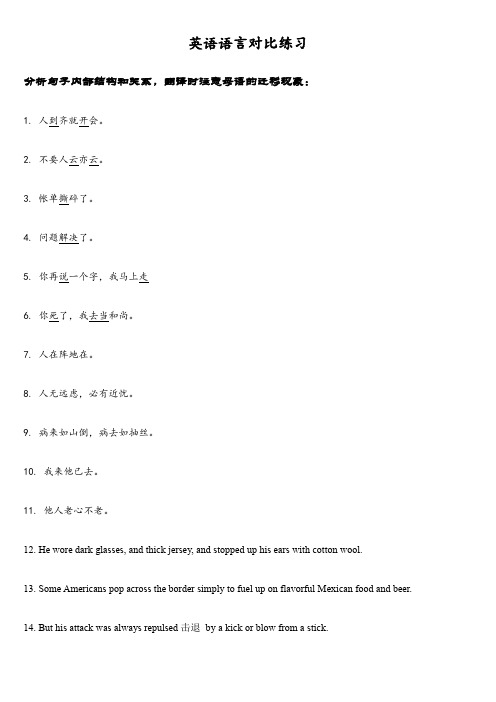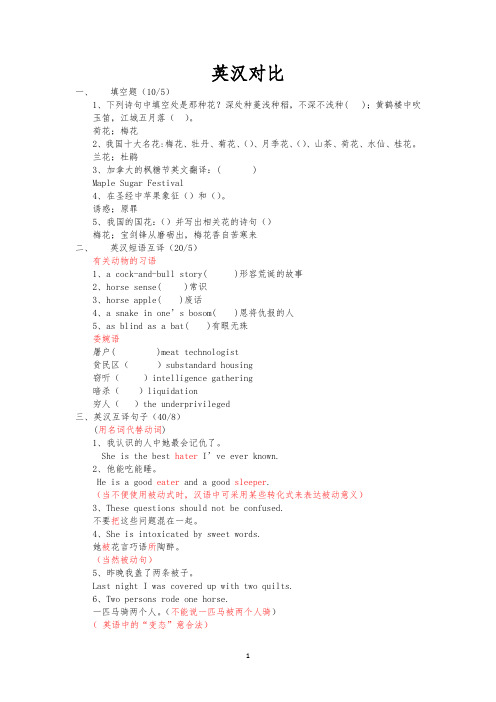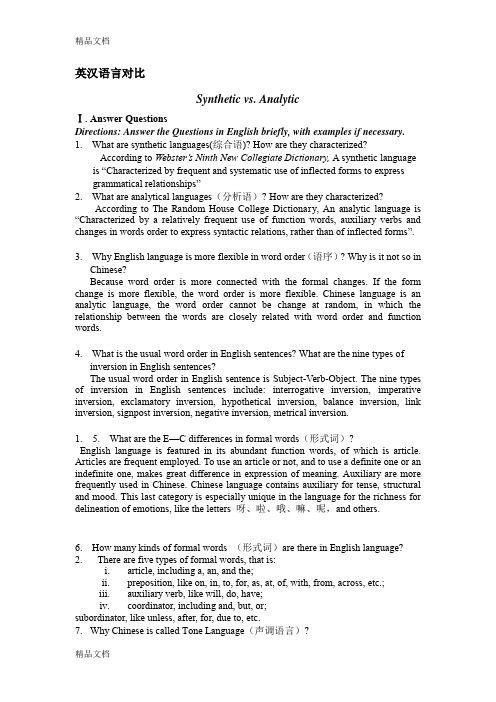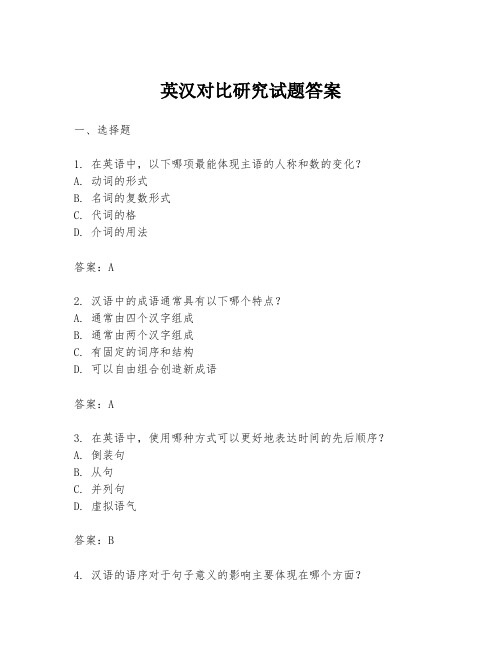英汉语言对比练习答案2
新英汉翻译教程 第三章.英汉语言对比答案

小节结束
16 返回章重点 退出
3. 1. 3 英语爱用静态词,汉语常用动态词
英语喜欢使用静态词汇,而汉语则 多使用动态词汇,英译汉时常常把原文 中表示动作意义的静态叙述转换成汉语 的动态叙述。
第 三 章 重 点
3. 2 英汉词汇表达对比
3.2.1 英语词汇含义多 3.2.2 英语词汇搭配多 3.2.3 英语词汇在句中的位置多
课堂互动2
3. 3 英汉句法结构对比
3.3.1 英汉句子结构的互换 A. 英语简单句可转换成汉语复合句 B. 英语并列句、复合句可转换成汉语简单句 3.3.2 英汉句子顺序的调整 A.调整时间顺序 B.调整空间顺序 课堂互动3 C.调整逻辑顺序
17 返回章重点 退出
例1:Inspiration is the number one cause of greatness. If information is power, then inspiration must be the power of our potential. The power that moves us from the systematic to the spontaneous. From ideas to results.
【译文】这时候,他从烤架上拿了些羊肉,庄重地送 到我们面前,我们各自取了一些,可是我们早已 没有了胃口,只不过做做样子,装吃罢了。
15 返回章重点 退出
例2:Harvard Business School opened in the early 20th century, and pioneered the casestudy method of teaching—making use of real-world scenarios, instead of relying on academic theory—a methodology that has remained the bases for many MBA programmes around the world today.
英汉互译英汉语言对比练习2

英语语言对比练习分析句子内部结构和关系,翻译时注意母语的迁移现象:1. 人到齐就开会。
2.不要人云亦云。
3. 帐单撕碎了。
4. 问题解决了。
5.你再说一个字,我马上走6. 你死了,我去当和尚。
7. 人在阵地在。
8. 人无远虑,必有近忧。
9. 病来如山倒,病去如抽丝。
10. 我来他已去。
11. 他人老心不老。
12. He wore dark glasses, and thick jersey, and stopped up his ears with cotton wool.13. Some Americans pop across the border simply to fuel up on flavorful Mexican food and beer.14. But his attack was always repulsed击退by a kick or blow from a stick.15. Kino hurrying towards to his house, felt a surge of exhilaration.分析观察汉语的句式并翻译:1. 他决定去拉车,/就拉车去了。
/赁了辆破车,/他先练练腿。
/第一天没拉着什么钱。
/第二天的生意不错,/可是躺了两天,/他的脚脖子肿得像两条瓠子似的,/再也抬不起来。
2. 原来这婆娘自从药死武大,/哪那里肯带孝,/每日只是浓妆艳抹,/和西门庆作一处取乐。
/听得武松叫声“武二归来了”,/慌忙去面盆里洗落了脂粉,/剥去了首饰钗环,/蓬松挽了个髻,/脱去了红裙绣袄,/旋穿上孝群孝衫,/便从楼上哽哽咽咽假哭下来。
//3. 武松沉吟了半晌,/便出门去,/径投县里来;/开了锁,/去房里换了一身素净衣服,/便叫士兵打了一条麻绦,/系在腰里;/身边藏了一把尖长柄短背厚刃薄的解腕刀,/取了些银两带在身边。
翻译时注意英汉两种语言之间修饰语的差异:•姑娘•北京姑娘•漂亮的北京姑娘•年轻漂亮的北京姑娘•身材苗条年轻漂亮的北京姑娘•两个身材苗条年轻漂亮的北京姑娘•正看着我们的两个身材苗条年轻漂亮的北京姑娘正面带笑容看着我们的两个身材苗条年轻漂亮的北京姑娘翻译下面句子,注意英汉两种语言形合与意合的差异:5.All was cleared up some time later when news came from a distant place that an earthquake was felt the very day the little copper ball fell.6.When I try to understand what it is that prevents so many Americans from being as happy as one might expect, it seems to me that there are two causes, of which one goes much deeper than the other.7. It has been a fine, golden autumn, a lovely farewell to those who would close their youth, and some of them their lives, before the leaves turned again in a peacetime fall.8. The many colors of a rainbow range from red on the outside to violet on the inside.9. He had a disconcerting habit of expressing contradictory ideas in rapid succession.10. Power can be transmitted over a great distance with practically negligible loss if it is carried by an electric current.11. The present onslaught猛攻/猛击of vehicles poses a serious threat to urban life and pedestrian peace of mind.12.He boasts that a slave is free the moment his feet touch British soil and he sells the children of the poor at six years of age to work under the lash in the factories for sixteen hours a day.13.They would have had to live the rest of their lives under the stigma耻辱/瑕疵that they had recklessly precipitated an action which wrecked the Summit Conference and conceivably could have launched a nuclear war.14. Could any spectacle, for instance, be more grimly可怕whimsical荒谬than that of gunners using science to shatter men’s bodies while, cl ose at hand, surgeons use it to restore them?15. There is nothing more disappointing to a hostess who has gone to a lot of trouble or expense than to have her guest so interested in talking politics or business with her husband that he fails to notice the flavor of the coffee, the lightness of the cake, or the attractiveness of the house, which may be her chief interest and pride.1.说是说了,没有结果。
英汉对比单元测试题及答案

英汉对比单元测试题及答案一、选择题(每题2分,共20分)1. 在英语中,“book”一词的意思是:A. 书B. 笔C. 桌子D. 椅子答案:A2. 英语中的“happy”和汉语中的“快乐”在意义上:A. 完全不同B. 部分相似C. 完全相同D. 部分相反答案:C3. 汉语中的“苹果”在英语中对应的词是:A. appleB. orangeC. bananaD. grape答案:A4. 英语中的“she”指的是:A. 他B. 她C. 它D. 他们答案:B5. 以下哪个词组在英语和汉语中意义相同?A. 看医生B. 看门狗C. 看电影D. 看风景答案:C二、填空题(每空1分,共10分)6. 英语中的“family”在汉语中通常翻译为_。
答案:家庭7. 汉语中的“学习”在英语中可以翻译为_。
答案:study 或 learn8. 英语中的“thank you”在汉语中通常翻译为_。
答案:谢谢9. 汉语中的“老师”在英语中对应的词是_。
答案:teacher10. 英语中的“good morning”在汉语中翻译为_。
答案:早上好三、翻译题(每题5分,共30分)11. 将下列英语句子翻译成汉语:- "What's your name?"答案:你叫什么名字?12. 将下列汉语句子翻译成英语:- 我喜欢吃苹果。
答案:I like eating apples.13. 将下列英语句子翻译成汉语:- "Where are you going?"答案:你要去哪里?14. 将下列汉语句子翻译成英语:- 她是一名医生。
答案:She is a doctor.四、简答题(每题5分,共20分)15. 英语和汉语在语法结构上有哪些主要差异?答案:英语和汉语在语法结构上的主要差异包括:英语使用主谓宾结构,而汉语则更倾向于主谓宾或主宾谓;英语中动词时态和语态的变化较为复杂,汉语则通过时间词和上下文来表达;英语中有明确的冠词使用规则,而汉语中则没有冠词。
英汉对比总题库

英汉对比一、填空题(10/5)1、下列诗句中填空处是那种花?深处种菱浅种稻,不深不浅种( );黄鹤楼中吹玉笛,江城五月落()。
荷花;梅花2、我国十大名花:梅花、牡丹、菊花、()、月季花、()、山茶、荷花、水仙、桂花。
兰花;杜鹃3、加拿大的枫糖节英文翻译:( )Maple Sugar Festival4、在圣经中苹果象征()和()。
诱惑;原罪5、我国的国花:()并写出相关花的诗句()梅花;宝剑锋从磨砺出,梅花香自苦寒来二、英汉短语互译(20/5)有关动物的习语1、a cock-and-bull story( )形容荒诞的故事2、horse sense( )常识3、horse apple( )废话4、a snake in one’s bosom( )恩将仇报的人5、as blind as a bat( )有眼无珠委婉语屠户( )meat technologist贫民区()substandard housing窃听()intelligence gathering暗杀()liquidation穷人()the underprivileged三、英汉互译句子(40/8)(用名词代替动词)1、我认识的人中她最会记仇了。
She is the best hater I’ve ever known.2、他能吃能睡。
He is a good eater and a good sleeper.(当不便使用被动式时,汉语中可采用某些转化式来表达被动意义)3、These questions should not be confused.不要把这些问题混在一起。
4、She is intoxicated by sweet words.她被花言巧语所陶醉。
(当然被动句)5、昨晚我盖了两条被子。
Last night I was covered up with two quilts.6、Two persons rode one horse.一匹马骑两个人。
英汉语言对比练习答案2

1.翻译下列句子,注意调整语序1)A reader’s perception of the loose, slangy, colloquial, shirt-sleeved quality of much modern prose will be sharpened if he has experienced the conscious elegance of eighteenth-century writers and the solemn lecture-hall pronouncements of the Victorians. (按照逻辑顺序译)【译文】如果一位读者读过18世纪作家的作品,体会到其刻意追求典雅的语言风格,又读过维多利亚女王时代的人在演讲大厅上所作的庄严的发言,他定能更深刻地理解很多现代散文作品那种结构松散、口语色彩浓、好用俚语、不拘形式的语言风格。
2)He felt a qualm in his stomach, and it was more in memory of his own loneliness than anticipation of hers.(按照信息中心译)【译文】他感到一阵心酸,与其说是预见了她的凄凉,倒不如说是想到了他自己的孤独。
3)Based on national realities and taking reasonable aspects of foreign economies, Chinese economists are working to establish socialist market economy, which ensures economic activities follow the requirements of the law of value and the changing relationship between supply and demand. (按照搭配需要译)【译文】在立足本国实际和借鉴海外经济合理成分的基础上,中国经济学者正致力于建立社会主义市场经济,要保证经济活动遵循价值规律的要求,适应供求关系的变化。
最新英汉语言对比-习题·+答案

英汉语言对比Synthetic vs. AnalyticⅠ. Answer QuestionsDirections: Answer the Questions in English briefly, with examples if necessary. 1.What are synthetic languages(综合语)? How are they characterized?According to Webster’s Ninth New Collegiate Dictionary, A synthetic language is “Characterized by frequent and systematic use of inflected forms to express grammatical relationships”2.What are analytical languages(分析语)? How are they characterized?According to The Random House College Dictionary, An analytic language is “Characterized by a relatively frequent use of function words, auxiliary verbs and changes in words order to express syntactic relations, rather than of inflected forms”.3.Why English language is more flexible in word order(语序)? Why is it not so inChinese?Because word order is more connected with the formal changes. If the form change is more flexible, the word order is more flexible. Chinese language is an analytic language, the word order cannot be change at random, in which the relationship between the words are closely related with word order and function words.4.What is the usual word order in English sentences? What are the nine types ofinversion in English sentences?The usual word order in English sentence is Subject-Verb-Object. The nine types of inversion in English sentences include: interrogative inversion, imperative inversion, exclamatory inversion, hypothetical inversion, balance inversion, link inversion, signpost inversion, negative inversion, metrical inversion.1. 5.What are the E—C differences in formal words(形式词)?English language is featured in its abundant function words, of which is article. Articles are frequent employed. To use an article or not, and to use a definite one or an indefinite one, makes great difference in expression of meaning. Auxiliary are more frequently used in Chinese. Chinese language contains auxiliary for tense, structural and mood. This last category is especially unique in the language for the richness for delineation of emotions, like the letters 呀、啦、哦、嘛、呢,and others.6.How many kinds of formal words (形式词)are there in English language?2.There are five types of formal words, that is:i.article, including a, an, and the;ii.preposition, like on, in, to, for, as, at, of, with, from, across, etc.;iii.auxiliary verb, like will, do, have;iv.coordinator, including and, but, or;subordinator, like unless, after, for, due to, etc.7.Why Chinese is called Tone Language(声调语言)?Chinese tone can be used for indicating the change of meaning and is not suitable for expressing the certainty, completeness, independence or finality.Ⅱ. Fill in the BlanksDirections: Fill in the blanks with the best answer you have found in the textbook.1.11.综合语的特征是经常性、系统性的运用曲折形式来表现语法关系为特征的语言,分析语的特征是分析语的特征是相对频繁地使用功能词,助词和改变词序来表达句法关系,而不用曲折形式来表达。
英汉语言对比练习

班级:姓名:学号:序号:
根据相关英汉语言对比知识回答下列问题:
1.英汉语动词在语法意义和造句作用方面有什么差异?此种差异对翻译和第二
语言习得有什么借鉴意义?
2.如何理解英语重形合、汉语重意合?英汉语此种特征对翻译有什么指导意
义?
3.什么是异化和归化?在语际转换过程中,异化原则和归化原则可用于解决那
些问题?
4.英汉语合成构词有什么区别?其各自的特点对于翻译实践有何意义?
5.英汉语语序有何差异?
6.为什么说英语是树状结构语言而汉语是竹状结构语言?此种差异对英汉互译有什么样
的启示?
7.如何理解英语是静态语言而汉语是动态语言?举例说明此种差异对翻译的指导意义。
8.什么是话题和评论?如何理解汉语多话题-评论型句式而英语多主语-谓语型句式?举例
说明。
9.英汉名词的语法功能之间的差异是什么?
10.为什么有些语言学家认为英语是综合-分析语?
11.试从英汉思维差异说明说明为什么英语多物称主语,而汉语多人称主语?
12.英汉定语的位置和词序有何差异?
13.“祈使句+陈述”能表示哪些意义?
14.什么情况下英语要使用被动句?
15.英汉社会差异有何差异?。
英汉对比研究试题答案

英汉对比研究试题答案一、选择题1. 在英语中,以下哪项最能体现主语的人称和数的变化?A. 动词的形式B. 名词的复数形式C. 代词的格D. 介词的用法答案:A2. 汉语中的成语通常具有以下哪个特点?A. 通常由四个汉字组成B. 通常由两个汉字组成C. 有固定的词序和结构D. 可以自由组合创造新成语答案:A3. 在英语中,使用哪种方式可以更好地表达时间的先后顺序?A. 倒装句B. 从句C. 并列句D. 虚拟语气答案:B4. 汉语的语序对于句子意义的影响主要体现在哪个方面?A. 主谓一致B. 修饰语的位置C. 动词的时态D. 名词的数答案:B5. 英语中的动词时态主要用来表达什么?A. 说话者的情绪B. 动作发生的时间和状态C. 句子的连贯性D. 语气的强度答案:B二、填空题1. 在英语中,第三人称单数的现在时动词通常需要在词尾加上________。
答案:-s2. 汉语中的量词用于表示事物的数量,而在英语中,通常使用________来表示类似的功能。
答案:冠词3. 英语中的虚拟语气多用于表达非现实情况,如假设、建议等,而在汉语中,通常使用________来表达类似的语气。
答案:情态动词4. 汉语中的成语往往具有深厚的文化内涵和历史背景,而在英语中,相应的表达方式可能是________。
答案:习语或idiom5. 英语中的名词有可数和不可数之分,而在汉语中,名词通常可以通过________来表示数量。
答案:量词三、简答题1. 请简述英语中的被动语态及其用法。
答:被动语态是英语中的一种语态,用来强调动作的承受者而非执行者。
它通过使用“be”动词的适当形式加上主动语态动词的过去分词来构成。
被动语态常用于当动作的执行者未知、不重要或希望突出动作承受者时。
2. 汉语中的“把”字句和“被”字句有什么区别?答:“把”字句和“被”字句都是汉语中用来表示动作和受事的结构。
不同之处在于,“把”字句强调动作的完成和受事的改变,通常用于有具体结果的情境;而“被”字句则强调受事的被动状态,不一定要求动作完成,更多地用于表达受事的遭遇或经历。
- 1、下载文档前请自行甄别文档内容的完整性,平台不提供额外的编辑、内容补充、找答案等附加服务。
- 2、"仅部分预览"的文档,不可在线预览部分如存在完整性等问题,可反馈申请退款(可完整预览的文档不适用该条件!)。
- 3、如文档侵犯您的权益,请联系客服反馈,我们会尽快为您处理(人工客服工作时间:9:00-18:30)。
1.翻译下列句子,注意调整语序
1)A reader’s perception of the loose, slangy, colloquial, shirt-sleeved quality of much modern prose will be sharpened if he has experienced the conscious elegance of eighteenth-century writers and the solemn lecture-hall pronouncements of the Victorians. (按照逻辑顺序译)
【译文】如果一位读者读过18世纪作家的作品,体会到其刻意追求典雅的语言风格,又读过维多利亚女王时代的人在演讲大厅上所作的庄严的发言,他定能更深刻地理解很多现代散文作品那种结构松散、口语色彩浓、好用俚语、不拘形式的语言风格。
2)He felt a qualm in his stomach, and it was more in memory of his own loneliness than anticipation of hers.(按照信息中心译)
【译文】他感到一阵心酸,与其说是预见了她的凄凉,倒不如说是想到了他自己的孤独。
3)Based on national realities and taking reasonable aspects of foreign economies, Chinese economists are working to establish socialist market economy, which ensures economic activities follow the requirements of the law of value and the changing relationship between supply and demand. (按照搭配需要译)
【译文】在立足本国实际和借鉴海外经济合理成分的基础上,中国经济学者正致力于建立社会主义市场经济,要保证经济活动遵循价值规律的要求,适应供求关系的变化。
4)For example, a girl student who had difficulty studying made dramatic strides when she got a better desk lamp and moved her desk away from her bed.(按照时间顺序)【译文】例如,有位女学生,原来学习很吃力,但自从换了一盏好台灯,并把桌子从床边搬开以后,学习就取得了长足的进步。
5)There are few moments in life that bring husband and wife closer in reflective communion than the first October moment by a blazing hearth when they inhale the odor of mothballs in each other’s sweaters and agree it’s time they once again had a long talk.
【译文】十月初临,夫妻俩傍倚着融融的炉火,都能闻到对方毛衣散发出的卫生球气味,默契地认为是他们在一起促膝长谈的时候了,如此亲密无间地沉浸在感情交流之中,一生能有几回。
